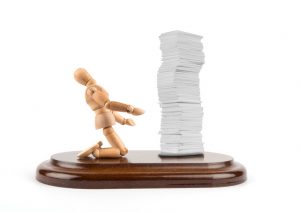
Try taking out the double spaces after the periods. Bump the margins. That’ll fix it!
As many lawyers know from firsthand experience, numerous courts have word or page limits to keep attorneys from submitting extremely lengthy papers to a judge. Judicial resources are limited, and court officers need to impose size restrictions to ensure that they have sufficient time to read and carefully digest materials. Although lawyers sometimes try to be crafty to get around length limitations, and may struggle to conform their papers to the requirements of court rules, lawyers should try to keep their arguments short and simple since this will increase the chances that the court will review and properly digest legal arguments.
When I was in Biglaw, we were once tasked with writing an appeal, and the page limit for the appeal was either 30 or 40 pages. Our office tried everything possible to keep our arguments within the limit. We deleted the controversial second period after sentences so that we could save some spaces on each and every page. Moreover, we deleted unnecessary string cites and stuck to the most important authorities to buttress our points. Throughout the process, I thought how foolish it was that we were bending over backward to cut our argument down to exactly what the page limit was. Surely, the court could see what they were doing, and the court would likely just appreciate it if we made the brief substantively shorter.
There are a variety of reasons why it pays to keep legal writing short and sweet. For one, this makes it far more likely that people will actually read and digest the materials. No one likes to read long, voluminous papers. When someone is confronted with a long piece of legal writing, they are far more likely to skim the pages and not read everything as closely. This is because individuals likely have a set amount of time to review the materials no matter how long the legal writing is.
As a result, shorter legal writing may be preferable, since this makes it more likely that court officers and other individuals will read those materials. In addition, if court officers have less information to digest, it is more likely that they will be able to keep the details of a matter in their heads when matters are argued and decided. Judges and court officers usually have to review dozens or more matters in a given week, and if lawyers keep their papers to a minimum, it is more likely that a court will be able to better grasp the issues involved in a case.
Good legal writing is also usually shorter because this can help focus the attention of the court. If someone has good arguments, it pays to focus on those arguments in a succinct manner. This ensures that the arguments are properly digested by the court since the court’s attention will be on those arguments alone and they can have the most impact on a judge. If a party has lengthy legal writing that relies on a number of arguments, it is possible that the court may be distracted by arguments that are less strong.
Of course, there are sometimes reasons why lawyers need to include numerous arguments, and accordingly, have longer papers. For instance, preserving arguments for appeal might require a lawyer to devote space to an argument that might not have the best chance of winning. Nevertheless, by and large, it pays to focus on a few solid arguments and keep the papers short to amplify those arguments.

Why Better Billing Statements Can Improve Your Firm’s Finances—And Your Client Relationships
Outdated billing is costing law firms money. Discover how clear, modern billing practices boost profits, trust, and cash flow in 2025.
Short and concise legal writing is also more cost effective in many instances and can help protect a client’s bottom line. When I was in Biglaw, the firm would sometimes bill tens of thousands of dollars writing voluminous briefs on every simple thing in a litigation. I distinctly remember the firm spending an extreme amount of time working on a deficiency letter and discovery motion on an issue that was not that critical to the lawsuit.
I cannot imagine what it must have been like to be the client reviewing invoices for writing extensive papers involving a simple discovery motion. Of course, some lawsuits are extremely high stakes, and every issue needs to be litigated extensively. In such instances, law firms need to work up every issue and clients likely understand that is important to draft comprehensive legal papers even though an issue is relatively minor. However, clients will also likely appreciate shorter legal writing in many instances since shorter legal writing is often less expensive and can help preserve a client’s war chest for other matters in a lawsuit.
All told, lawyers tend to be a verbose group of people, and I am sure most lawyers have struggled with space limitations or know a colleague who has. However, short legal writing is usually better legal writing, and judges and clients may appreciate it if a lawyer keeps their papers short and sweet, especially if they are briefing a relatively minor issue.
 Jordan Rothman is a partner of The Rothman Law Firm, a full-service New York and New Jersey law firm. He is also the founder of Student Debt Diaries, a website discussing how he paid off his student loans. You can reach Jordan through email at [email protected].
Jordan Rothman is a partner of The Rothman Law Firm, a full-service New York and New Jersey law firm. He is also the founder of Student Debt Diaries, a website discussing how he paid off his student loans. You can reach Jordan through email at [email protected].
